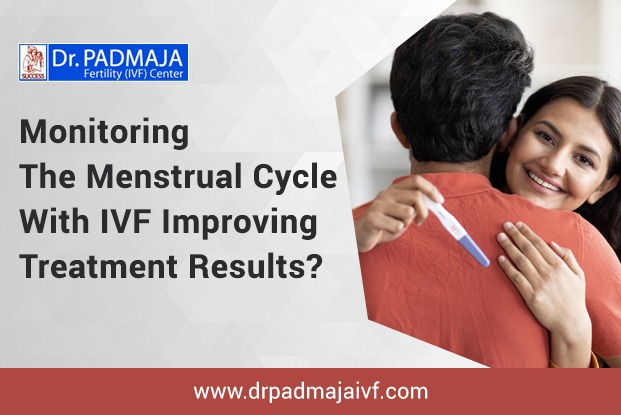In the journey to parenthood, especially when navigating fertility challenges, timing is everything. For couples considering IVF treatment in Hyderabad, understanding and monitoring the menstrual cycle can be the key to optimizing success. Fertility experts now emphasize that careful cycle tracking plays a vital role in improving IVF outcomes.
At renowned centers like Dr Padmaja IVF Center, recognized as one of the best fertility centres in Hyderabad, personalized fertility plans based on cycle monitoring help increase the chances of a healthy pregnancy. In this blog, we explore why menstrual cycle tracking matters in IVF and how it enhances your treatment experience.
Why Is Monitoring the Menstrual Cycle Important in IVF?
The menstrual cycle is a natural indicator of a woman’s reproductive health. By closely observing hormonal patterns, ovulation timing, and the uterine lining, fertility specialists can plan IVF protocols more effectively.
Cycle monitoring helps determine:
The right time to stimulate egg production
The best moment for egg retrieval
The ideal conditions for embryo transfer
Any irregularities that could affect treatment success
At DrPadmaja Fertility Center, infertility doctors in Hyderabad use advanced tools like ultrasound scans and hormone testing to track these patterns accurately, ensuring that IVF is initiated under the most favorable conditions.
Key Phases of the Menstrual Cycle and Their Role in IVF
Understanding how each phase of the cycle impacts IVF can help you feel more informed and involved in your treatment journey.
1. Follicular Phase (Day 1–13)
The first day of menstruation marks the start of this phase. During this time, hormones like FSH (Follicle-Stimulating Hormone) stimulate the development of follicles in the ovaries.
What doctors monitor: Follicle growth and estrogen levels.
Impact on IVF: Fertility doctors determine the best time to start stimulation injections.
2. Ovulation (Around Day 14)
During ovulation, the ovary releases a fully grown egg. Accurate detection is critical in both natural and assisted conception.
What doctors monitor: LH surge and follicle maturity through ultrasound.
Impact on IVF: Helps schedule egg retrieval precisely, increasing chances of retrieving viable eggs.
3. Luteal Phase (Day 15–28)
This is the post-ovulation phase where the uterine lining prepares for embryo implantation.
What doctors monitor: Progesterone levels and endometrial thickness.
Impact on IVF: Guarantees that the uterus is open when the embryo is transferred.
Fertility experts at DrPadmaja IVF Center use real-time monitoring to align these phases with IVF procedures, reducing the risk of cycle cancellation and improving pregnancy rates.
How Fertility Treatment Centers in Hyderabad Monitor Your Cycle
Modern fertility clinics like DrPadmaja Fertility Center, one of the best IVF centers in Hyderabad, follow evidence-based protocols that involve:
Blood tests to check hormone levels (estrogen, LH, progesterone).
Cycle calendar tracking to time medication and procedures with your body’s natural rhythm.
This hands-on, detail-oriented approach sets the foundation for better IVF results.
Benefits of Cycle Monitoring in IVF
Choosing a center that focuses on cycle tracking offers several advantages:
Increased IVF Success Rates
Accurate timing leads to healthier egg retrieval, embryo development, and uterine receptivity—key factors in achieving pregnancy.
Personalized Treatment
Your protocol is customized based on your unique cycle and hormonal profile, rather than a one-size-fits-all plan.
Fewer Canceled Cycles
Early detection of potential problems (like anovulation or hormone imbalance) allows for timely intervention.
Better Understanding for Patients
You gain confidence in your treatment choices as you learn more about your fertility and how your body reacts.
IVF Cost and Value of Monitoring
While patients are often concerned about IVF cost, it’s important to see the value in comprehensive monitoring. Clinics like Dr Padmaja IVF Center aim to provide affordable care without compromising on quality. Their approach minimizes failed cycles, which in turn can reduce long-term costs for patients.
As one of the top fertility treatment centers in Hyderabad, they offer transparent pricing along with personalized support, helping couples plan both emotionally and financially for their IVF journey.
Why Choose Dr Padmaja IVF Center?
If you’re looking for the best IVF center in Hyderabad, DrPadmaja Fertility Center stands out for its commitment to innovation, care, and success. Many select it for the following reasons:
Experienced Infertility Doctors in Hyderabad: The clinic is home to some of the most trusted fertility specialists.
Advanced Diagnostic Tools: From hormone panels to 3D ultrasounds, every step is backed by cutting-edge technology.
Compassionate, Patient-Centric Care: You’re treated as an individual, not a number. Emotional well-being is prioritized alongside medical excellence.
Affordable and Transparent IVF Cost: Cost-effective care that doesn’t cut corners.
Their holistic IVF approach, including in-depth cycle monitoring, gives couples the best possible start toward parenthood.
Final Thoughts
IVF is not just a science—it’s a journey of hope and precision. Monitoring the menstrual cycle is one of the most critical steps in improving the chances of success. It allows fertility doctors to time treatments perfectly and tailor protocols to each woman’s unique biological clock.
At Dr Padmaja IVF Center, you’ll receive expert care from some of the most experienced infertility doctors in Hyderabad, combined with compassionate support every step of the way. With a reputation as a best fertility centre in Hyderabad, and a track record of successful outcomes, this is a place where science and hope come together.
Whether you’re just beginning your fertility journey or considering a second opinion, cycle monitoring can make all the difference. Let your journey begin with the right timing, the right team, and the right support.
About the Author

This blog is penned by a devoted content specialist passionate about raising awareness around fertility treatments and emotional well- being. With in- depth disquisition on motifs like IVF and fertility, the thing is to give precious perceptivity for couples on their trip to parenthood.
Frequently Asked Questions (FAQs)
- Why is monitoring the menstrual cycle important in IVF treatment?
Monitoring helps doctors understand your natural hormone levels, ovulation patterns, and endometrial readiness. This information is crucial for optimizing timing during ovarian stimulation, egg retrieval, and embryo transfer.
- How is the menstrual cycle monitored during IVF?
Monitoring typically includes blood tests to measure hormone levels (like estrogen, LH, and progesterone) and transvaginal ultrasounds to track follicle growth, ovulation, and endometrial thickness throughout the cycle.
- Does irregular menstruation affect IVF success?
Yes, irregular cycles can make it harder to predict ovulation and may affect egg quality or endometrial receptivity. However, with proper cycle monitoring and hormonal regulation, IVF can still be successful for women with irregular periods.
- Can IVF be timed with a natural menstrual cycle?
Yes. In a “natural IVF cycle,” no or minimal hormonal stimulation is used, and the treatment is timed with your body’s natural cycle. This is suitable for some women and often monitored closely to optimize timing.
- What happens if ovulation occurs before the scheduled egg retrieval?
If ovulation occurs prematurely, the cycle may be canceled. That’s why close monitoring of hormone levels and follicular development is essential to adjust medications and prevent early ovulation.
- How does endometrial thickness affect IVF outcomes?
A healthy endometrial lining (typically 7–14mm during implantation phase) is important for embryo implantation. Monitoring helps determine if the uterine lining is receptive, and adjustments can be made to support its growth if needed.
- What role do hormones play in cycle monitoring?
Hormones like FSH, LH, estradiol, and progesterone guide treatment decisions. Their levels help determine egg maturity, ovulation timing, and uterine lining health.

